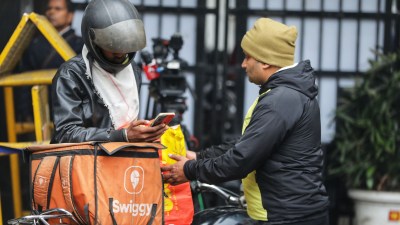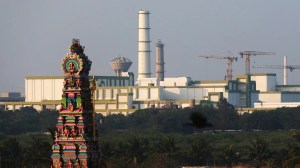China8217;s hitech war machine
A barely noticed aspect of the bomb saga is that China is working towards a clearly defined goal and that Pokharan too is being dexterously ...

A barely noticed aspect of the bomb saga is that China is working towards a clearly defined goal and that Pokharan too is being dexterously fitted into the scheme. The goal is nothing less than upstaging the United States militarily as well as politically.
Over-ambitious? Not if you are Chinese. No country is more relentless, more singleminded in the pursuit of its national interest than China. It may even be said that the Chinese political leadership is the cleverest one going, not only because of its native shrewdness but also because it is not sidetracked or circumscribed by nuisances like democracy.
This is the ground reality against which we must assess the fact that a year ago China began publicly hinting that its ultimate aim was to turn hitech militarily and be better at it than today8217;s hitech powers. Typically, it set out to use the US for the purpose of doing one up on the US.
Notice the cleverness of the timing and the methodology. The first public announcements came last year when the wholeworld had congregated in Hong Kong with eyes and ears focussed on Beijing. And the announcements were made by a cross-section of highly placed quot;technicalquot; people Vice Chairman of the Central Military Commission, the most influential general in the armed forces, Liu Huaqing; a leading member of the National Defence Commission; Vice President of the China National Electronics Import and Export Corporation, CNEIEC. They also involved the Commission on Science, Technology, and Industry for National Defence and the PLA8217;s Equipment Department.
With all the world listening, Beijing announced a massive new initiative: The China International Defence Electronics Exhibition in Beijing in May 1998. Said CNEIEC8217;s Lu Jide: quot;The event will be a good opportunity for foreigners to enter China8217;s defence market.quot;
Here quot;foreignersquot; primarily meant Americans because a China had already been furiously negotiating with Russia, Britain and Israel without much success, and b it was the demonstration of Americanelectronics technology in the Gulf War that finally made China decide that it should have that technology one way or another.
The quot;foreignersquot; came salivating because the Chinese defence market was the biggest bait they could have. Official projections estimated annual sales of US 124 billion in electronic technology and equipment alone by the turn of the century.
China let it be known that it was looking for foreign involvement in radar systems, navigational systems, military computers, simulators, test equipment and microwave components. Special emphasis was placed on advanced airborne warning and control systems, equipment that would allow China8217;s air force to operate far beyond Chinese borders.
Small wonder that Americans took the bait. The post-Tiananmen embargo on military supplies was violated by several private US corporations and diluted by the US establishment. Today we have a situation where the US is openly courting China as its closest trading and political partner in Asia.
8220;To winwithout fighting is bestquot;, said ancient military strategist Sun Tzu. As far as the US is concerned, China has already won without fighting.Two points emerge from this that must engage the attention of Indians at the official and intellectual levels. First, India is a factor in Chinese strategy only marginally: a country that must be kept down so that it won8217;t ever become a challenge to China. This is easily accomplished by exploiting border tensions along the Himalayas and, more effectively, by building up Pakistan as a political-military counter to India. If at any time India does raise its head defiantly, Beijing will come crushing down on it. Hence the present drive to organise an international axis against India and President Jiang Zemin himself saying that India8217;s target is China.
Secondly, the powers China considers necessary to upstage in order to establish its world hegemony are the US in the West and Japan in the east. Japan is right now ignorable because it is officially non-military. And the USis being tackled in ways we are witnessing.
With hindsight we can now see that India was naive in the 8217;50s when it set itself up as the only friend of a completely ostracised Red China8217; and Yellow Peril8217;. China used India until it won recognition in world forums and then unravelled its master plan for South Asia.
America is naive today as it consults its former enemy against an open society like India. It too will realise sooner rather than later that China has only one interest China8217;s supremacy.
There are of course Americans who are uncomfortable about China8217;s overall profile and about Washington8217;s newfound love affair with Beijing. Unreported in India, US citizens have been asking about the 13 Chinese intercontinental missiles pointed at the US and why India should not have a bomb if the US and China could have bombs.
As far back as 1991, a Western academic raised issues that seem prescient now. Francis Pike said: 8220;Early in the next century the US will cease to be the world8217;s largest economy,and for the first time in more than 100 years will be overtaken by China as the world8217;s most powerful nation.8221; Clinton8217;s America helps the process because China has smartly caught it in its grip.
On the one hand, Beijing funnelled substantial funds to his Democratic Party coffers and is now in a position to embarrass Clinton and his party if they don8217;t play ball. On the other, India8217;s bomb has provided a convenient excuse to draw a highfalutin America into the game. Ironically, Francis Pike himself had brought up the relevance to America and the West of the two other Asian powers. He spoke of 8220;the importance of Japan as a bulwark against Chinese power8221; and of how 8220;in India the West has a perfect candidate for partnership.8221; Apparently these words have not registered.
It is China8217;s business to pursue the goal of world supremacy. No one prevents India from aiming singlemindedly at achieving Indian supremacy. The point is that China has been going about it systematically and gaining its objectives onecareful step at a time. Last year it even banned scientists and researchers in classified projects from changing jobs. There are many lessons to learn from the Chinese way of doing things. If we learn at least some of them the ongoing blasts in Indian politics will have been worth it.
- 01
- 02
- 03
- 04
- 05































